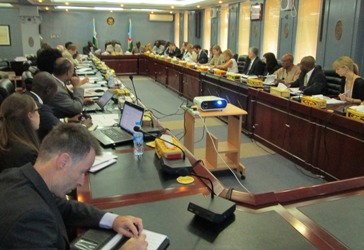South Sudan’s national reconciliation conference delayed until June
March 23, 2013 (JUBA) – The long awaited national reconciliation conference, which aims to launch a journey of healing the wounds of the bitter past among communities emanating from the decades of war in South Sudan, is rescheduled to take place on June 1, 2013.

However, the two sides concentrated on implementation of other clauses of the agreement, particularly the provision of referendum on self-determination which eventually resulted to the split of the former Sudan into two republics in July 2011.
South Sudan’s officials say Khartoum showed no interest in the reconciliation process during the six-year interim period partly because the war was still raging on in Darfur.
Rocked by a series of intertribal conflicts, armed rebellions, corruption, and other issues of governance and rule of law, the leadership of the new state said it was high time that the people were reconciled in order to achieve peace and security and development.
The expected long process was due to kick off on April 18 with a conference to be addressed by the president of the Republic, Salva Kiir Mayardit, which would then be followed by reconciliation campaigns across the country.
The organising committee on Saturday however announced that the date to convene the launching conference is rescheduled to 1st June this year in order to give ample time for the committee to make the necessary preparations for the event.
The presidential advisor on decentralisation and intergovernmental linkages, Tor Deng Mawien, who also chairs the committee, told the press that the decision was made during a meeting on Saturday chaired by the vice-president, Riek Machar Teny, after evaluating the preparations done and reviewing the timetable.
During a meeting on Saturday with a number of South Sudanese professors and intellectuals, Machar also called on the South Sudanese members of the academia to play an active role in the ongoing national reconciliation process in the country.
He particularly called on them to begin to participate in the first phase of the process that will witness the training next week in Juba of two hundred would-be peace mobilises who are selected from the ten states of the country.
Besides healing the past wounds, Machar said the reconciliation process will be crosscutting as it will also address the prevailing challenges of insecurity, good governance, accountability and transparency as well as planning in development, among others that may cause or might have caused discontent and disharmony in the society.
(ST)
